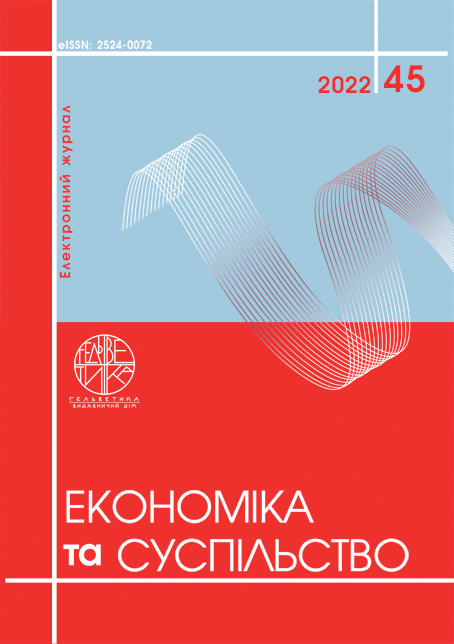THE ROLE OF COMMUNICATIVE MANAGEMENT IN THE SYSTEM OF PERSONNEL MANAGEMENT OF FOOD INDUSTRY ENTERPRISE
Abstract
Authorial vision of the role and place of communicative management in the system of personnel management of organization on the basis of the development of communication competence is offered in the article. Research testifies that communicative management influences on all subsystems of the system of personnel management of organization. Due to communicative management, personnel managers acquire communicative competence that is constituent in all HR-processes of organization. To find common language, speak with everybody (leaders, workers, applicants) during the realization of HR-processes (skilled administration, recruiting, onboarding, stimulation, development) is the functional duty of every personnel manager. The important factors of communicative competence for personnel manager are: oriented in the various communicative situations, based on knowledge and vital experience of individual; possibility effectively co-operate with surroundings due to understanding him/herself at permanent modification of mental conditions, interpersonal relations, terms of social environment; adequate person’s orientation - own psychological potential, potential of partner, situation; readiness and ability to build contacts with people, knowledge, ability and skills of structural communication; internal facilities of adjusting communicative actions; internal resources necessary for the construction of effective communicative action in the certain circle of situations of interpersonal cooperation. For evaluation of major factors of influence on the development of communicative competence of personnel managers on the example of food industry enterprise, their ranking was conducted. Expert questioning ‒ for ranging of influence factors on the development of communicative competence of personnel managers; statistical indexes of variation and grade correlation for the estimation of homogeneity degree of the expert’s survey results the following methods were used in the research. The results of ranking testify that most influence is carried out on the development of communicative competence by factors that is related to worker’s psychology and situational thinking in relation to the acceptance of administrative decision of personnel manager.
References
Баранецька А. Інформаційно-комунікаційний менеджмент: кризові практики. Вчені записки Таврійського національного університету імені В. І. Вернадського. 2021. Т. 32(71), № 6(3). С. 112–119.
Бурмака Т.М., Великих К.О. Комунікативний менеджмент : конспект лекцій (для студентів бакалаврату всіх форм навчання спеціальності 073 – Менеджмент); Харків. нац. ун-т міськ. госп-ва ім. О. М. Бекетова. Харків : ХНУМГ ім. О. М. Бекетова, 2019. 69 с.
Дзяна Г.О., Дзяний Р.Б. Управління комунікаціями в умовах криз. Дніпровський науковий часопис публічного управління, психології, права. 2022. Вип. 2. С. 13–21. URL: http://nbuv.gov.ua/UJRN/dnchpu_2022_2_4
Іщенко М.І., Міщук Є.В., Адамовська В.С., Усик Д.Д. Комунікаційний менеджмент в сучасних організаціях. Менеджер. 2018. № 3. С. 39–45. URL: http://nbuv.gov.ua/UJRN/Nzhm_2018_3_7
Коваленко О.М. Комунікативний менеджмент як інструмент взаємодії соціально відповідального бізнесу і соціальної держави. Актуальні проблеми державного управління. 2012. № 1. С. 201–207.
Левченко І. Соціальна комунікація як важлива складова інформаційно-комунікаційного простору. Соціум. Документ. Комунікація. 2022. Вип. 14. С. 253–265. URL: http://nbuv.gov.ua/UJRN/cdk_2022_14_14
Економіко-математичні методи і моделі в галузі управління персоналом : навчальний посібник: / Л.В. Мазник, Т.В. Березянко, О.В. Безпалько, А.Д. Бергер, Ю.М. Гринюк, О.М. Олійниченко. [За заг. редакцією Л.В. Мазник]. Київ : Кафедра, 2019. 278 с.
Baranetska A. (2021) Informatsiyno-komunikatsiynyy menedzhment: kryzovi praktyky. [Information and communication management: crisis practices]. Vcheni zapysky Tavriyskoho natsionalnoho universytetu imeni V. I. Vernadskoho. T. 32(71), № 6(3). S. 112–119.
Burmaka T.M., Velykykh K.O. (2019) Komunikatyvnyy menedzhment : konspekt lektsiy (dlya studentiv bakalavratu vsikh form navchannya spetsialnosti 073 – Menedzhment); Kharkiv. nats. un-t misk. hosp-va im. O.M. Beketova. Kharkiv : KHNUMH im. O.M. Beketova, 69 s. (in Ukrainian)
Dzyana H.O., Dzyanyy R.B. (2022) Upravlinnya komunikatsiyamy v umovakh kryz. [Management of communications in crisis conditions]. Dniprovskyy naukovyy chasopys publichnoho upravlinnya, psykholohiyi, prava. Vyp. 2. S. 13–21. URL: http://nbuv.gov.ua/UJRN/dnchpu_2022_2_4
Ishchenko M.I., Mishchuk YE.V., Adamovska V.S., Usyk D.D. (2018) Komunikatsiynyy menedzhment v suchasnykh orhanizatsiyakh. [Communication management in modern organizations]. Menedzher. № 3. S. 39–45. URL: http://nbuv.gov.ua/UJRN/Nzhm_2018_3_7
Kovalenko O.M. (2012) Komunikatyvnyy menedzhment yak instrument vzayemodiyi sotsialno vidpovidalnoho biznesu i sotsialnoyi derzhavy. [Communicative management as a tool of interaction between socially responsible business and the social state]. Aktualni problemy derzhavnoho upravlinnya. № 1. S. 201–207.
Levchenko I. (2022) Sotsialna komunikatsiya yak vazhlyva skladova informatsiyno-komunikatsiynoho prostoru. [Social communication as an important component of the information and communication space]. Sotsium. Dokument. Komunikatsiya. Vyp. 14. S. 253–265. URL: http://nbuv.gov.ua/UJRN/cdk_2022_14_14
Ekonomiko-matematychni metody i modeli v haluzi upravlinnya personalom (2019) navchalnyy posibnyk / L.V. Maznyk, T.V. Berezyanko, O.V. Bezpalko, A.D. Berher, YU.M. Hrynyuk, O.M. Oliynychenko. [Za zah. redaktsiyeyu L.V. Maznyk]. Kyiv : Kafedra, 278 s. (in Ukrainian)


